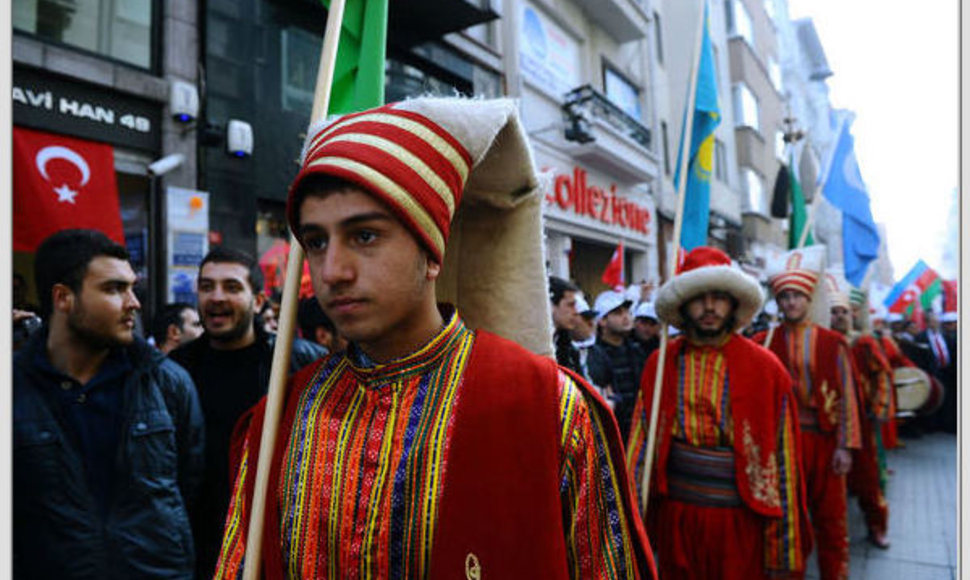- Please, tell us more about the movie “Corridor Without End”.
- I participated in this film as a military journalist and as a witness of the Khodjaly genocide, as a man who spent several weeks there starting from February 28 and all the first half of March, as a man who touched it directly, who had a chance to talk to those who survived, to see the military hospital and sanitary train and to see the corpses that were brought there, to the mosque and often buried without any expertise, quickly, because at the beginning of March it started to get warmer, and the corpses that were bought or exchanged for gasoline had already started to decompose.
There was no possibility of having experts to see how they died. But it was obvious, and other foreign journalists confirm it, that these people were killed from a short distance. I was surprised that the majority of them were defenseless people – women, children. It is even visible in the photograph that a woman has fallen down and her child too. And it is visible that they had closed their eyes.
The worst thing is that these people did not disappear, they keep holding high positions, they travel around the world, they are not punished, they feel free to publish books describing what they did then.
It is obvious that they were shot from a very close distance. This surprised journalists from Western countries, taking into account the fact that it was the first conflict of this kind on the territory of the former Soviet Union. Nobody expected that such atrocities could happen. We only know this from books about the Nazis, but now we started saying “Armenian fascism”. I do not accuse the entire Armenian nation, but I accuse those who conducted these atrocities.
The worst thing is that these people did not disappear, they keep holding high positions, they travel around the world, they are not punished, they feel free to publish books describing what they did then. Basically in the eyes of the whole world they feel themselves winners and right about the murder. As they said, “we do not kill the Azeri, we kill the Turks, we take revenge for 1915 or for Sumgait”.
This behavior forces former and current military journalists to fight for these people to be brought to the Hague court and we would be the witnesses there, offering our materials, photographs, whatever survived until today.
- Have you seen anything similar since?
- Yes. I saw it in Chechnya. It was basically repeating itself. One could feel the style of the military events in Baku, the events in Vilnius, when the Soviet troops entered it. And you know, during the January events in Baku, people were saying that these were not ordinary soldiers, that they were older, they behaved differently.
The same thing happened in Vilnius. The same happened in Chechnya. So the recruited soldiers in Chechnya were like cannon fodder, but the special forces were doing their bloody business. In 1995 I saw the same picture as I saw in Karabakh. It was twice as difficult for me and I knew the risk I was taking. There was not a single day in Chechnya without a journalist being wounded and no week without a journalist being killed.
- 20 years have passed since then. Did your attitude change somehow?
- Of course I am following events and I repeat again that although they say that time cures, there are some incurable things. It is maybe easier for me to talk about it, I am Lithuanian, but it is more difficult for an Azeri. But you know, the world's countries did not take any actions. Only Mexico and Pakistan recognized Khodjaly as a genocide.
The most frightening thing is that it happened recently, not in some remote past. When I am telling about what happened to the new generation, let’s say in Lithuania, they cannot believe it. I know that not all Armenians agree with the leaders of this occupied territory.
The bright future promised to them did not come and they have to live in a semi-destroyed territory, in the houses of strangers.
One deputy told me that once he went out of the building where negotiations with Armenians were taking place and the Karabakh Armenians came to him and asked “when will you finally kick them out of here”. The bright future promised to them did not come and they have to live in a semi-destroyed territory, in the houses of strangers, you can imagine how they feel there. I cannot imagine how one can live like this.
- What does the title of the documentary refer to?
- This ‘corridor’, as the Armenians called it, we entered it, both victims and victimizers, witnesses, I mean journalists, memorial centers, we all entered this corridor. But nobody went out of there because so far no man has been punished. This is the meaning of the title – we all are still there, the victims, the victimizers and the witnesses.
- What else do you plan to do within the project “Peace for the Caucasus”?
- As for me personally, within three months I will submit my books of memoirs for publication. This book will be interesting because it is not some political book, and it will be published as a semi-fictional book, although it is based on real events.
Another interesting thing is that I was just talking to the publishers and bringing the material and asking them if they would take it or not as it is, because I was not looking for any financing, I am not paid for my presentations. This is my credo. Although the Armenian lobby in the world accuses me of working for Azeri oil or anything else, just show me a man who gave me money? I always say that I never earn money from war. If I need money I would rather go to the UK but not to this region.
There are some other projects. First of all, the film should be presented to a foreign audience. I'm talking about the film festivals in Cannes, Venice, London, in Baku, in Central Asia and all over the world.















